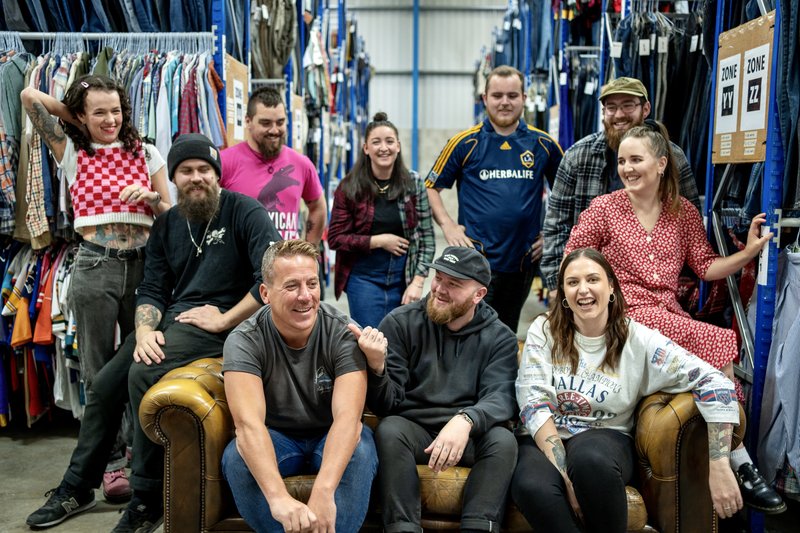Even million-dollar businesses start small. “My wife had some vintage dresses in her wardrobe that she wasn’t wearing, and she turned to eBay to list it,” says Carl Walker.
This was in 2010. Fast forward to today, and Carl’s eBay business, which he runs with his wife Katie, Sarah Dean and Sam Hunter, has essentially outgrown a 10,000-square-foot warehouse, has sold over 150,000 items and, at least as importantly, has made a name for itself as a pioneer in fashion sustainability.
Their company, Go Thrift, operates out of northern England, near Manchester. For Carl and his co-founders, business and sustainability aren’t oppositional forces at all: they complement each other. Go Thrift’s mission is focused around creating, “a brand-new life for secondhand clothes, because everyone deserves outfits they love that don’t cost the Earth, literally.”
Fast fashion, a term used to describe the lower-cost, high-paced production of clothes, is a gigantic industry, and one that contributes to a lot of waste. On average, our consumption of clothing each year is up 400% compared with 20 years ago — and while that may seem like a long time ago, well, 20 years ago was 2002.
The Water Footprint Calculator finds that it takes 659 gallons of water to make a single T-shirt, and over 2,100 gallons to make a single pair of jeans. The dyeing process creates unusable wastewater that, according to the United Nations Environment Programme, is the second largest polluter of water worldwide. It’s estimated that the fashion industry contributes as much as 10% of all global greenhouse gas emissions. While some unwanted clothing is donated, there’s simply too much of it.
Go Thrift is a massive retailer of secondhand clothing, collected from and sold around the world. From that first closet-full of vintage dresses, Go Thrift has expanded into a million-dollar business. “We ended up buying container loads, we ended up listing more and in time we ended up selling more,” says Carl.
These pre-loved items — vintage band T-shirts from the 1970s, rockabilly dresses from the 1950s, maximalist silhouettes from the 1980s — find a home on eBay. Go Thrift finds thousands of perfectly good articles of clothing, ready to be worn and adored by a new owner, and eBay provides the buyer. “eBay is a global marketplace that allows us to find a customer for almost every item of clothing,” says Carl. “We can’t sell bootcut jeans here in the U.K., but we can sell them in Eastern Europe.” Everything’s in style somewhere.
Go Thrift’s efforts to keep wearable, fashionable clothing out of landfills — around 57% of all discarded clothing usually ends up there, worldwide — has led to several plaudits. The company was given the Sustainable Seller Award at the eBay for Business Awards in 2021, and received funding from sustainable investment house OnePlanetCapital, which exclusively invests in companies that can make a significant impact on climate change. With that funding, Go Thrift plans to move into a warehouse that provides three times as much space. That will allow them to continue to expand their sustainable operations by, for example, investing in solar panels for clean energy.
“It's obviously vitally important that we make a difference and have an impact, but we're not just in it for that; there's also a business sense behind it, with the demand for secondhand,” says Carl. The renewed interest in recommerce — the selling and buying of secondhand goods — is no passing trend, as consumers consistently show a willingness to buy and wear pre-loved clothing. As Carl says: “If it's more affordable, if it's more sustainable, why wouldn't people consider wearing secondhand?”
Recommerce has been a part of eBay’s business since day one. Learn more at ebayinc.com/recommerce about how recommerce is creating economic opportunities for all, while contributing to a healthier planet.



